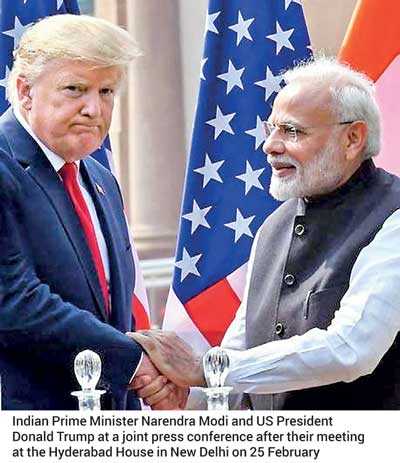Tuesday Feb 24, 2026
Tuesday Feb 24, 2026
Tuesday, 2 June 2020 00:00 - - {{hitsCtrl.values.hits}}
Washington DC (Press Trust of India): The US and India must develop a plan to counter a possible effort by China to strengthen its position in the Indian Ocean by deepening ties with Pakistan and Sri Lanka by taking advantage of their economic woes due to the coronavirus pandemic, an American think-tank has said.
There have been considerable concerns in India over China’s growing presence in the Indian Ocean region. India has been trying to expand maritime cooperation with countries of the region including Sri Lanka, Maldives, Indonesia, Thailand, Vietnam, Myanmar and Singapore, primarily with an aim to check the growing Chinese assertiveness.
According to the Hudson Institute think-tank, the coronavirus pandemic threatens not only lives and livelihoods in South Asia; it could also be the precursor of significant political and strategic shifts in the region.
The Bangladesh and Indian economies will survive the devastation, but their governments will have to restore growth by protecting and encouraging investment, the think-tank said in a report jointly authored by Indian-origin Hudson research scholar Aparna Pande and former Pakistan Ambassador to the US Husain Haqqani.
“Pakistan and Sri Lanka will likely move in the direction of negative growth and will need debt relief from their international creditors. Without it, Sri Lanka faces the prospect of a sovereign debt default. Both countries are likely to look to China as their benefactor, as their leaders have tended to do for a while,” it said.
According to the report titled ‘Crisis from Kolkata to Kabul: COVID-19’s Impact on South Asia,’ China will most likely press its advantage by bailing out South Asia’s indebted governments, “in exchange for its pound of flesh“.
“This would come at the expense of India’s security and US influence in the region. India and the United States must develop a plan to counter efforts China will likely make to strengthen its position in the Indian Ocean by deepening ties with Pakistan and Sri Lanka,” said the Hudson report, released this week.
Pakistan and Sri Lanka have been a target of Beijing’s ambitious Belt and Road (BRI) scheme, criticised for creating ‘debt traps’ by burdening fiscally weak countries with unsustainable debt.
The BRI is Chinese President Xi Jinping’s signature global infrastructure policy. First announced in 2013, the project promises to build ports, roads and railways to revive the ancient Silk Road and create new trade corridors linking China to Asia, Africa and Europe. The BRI also includes the China-Pakistan Economic Corridor (CPEC), which India opposed as it goes through Pakistan-occupied Kashmir (PoK).
In December 2017, Sri Lanka handed over the control of the southern sea port of Hambantota to China on a 99-year lease, triggering concern over Beijing’s efforts to expand influence in the Indian Ocean region.
Beijing has recently granted an “urgent” loan of $ 500 million to Colombo to help it fight the virus, which has infected over 1,465 people and claimed 10 lives in the country.
Earlier this month, China inked a $ 5.8 billion deal with Islamabad to build a dam in Gilgit-Baltistan, a move strongly opposed by India which said that carrying out such projects in territories under Pakistan’s illegal occupation was not proper.
The IMF has recently approved a loan of $ 500 million to cash-strapped Pakistan to cope with the economic crisis being posed by the coronavirus outbreak, which has infected over 59,000 people and killed more than 1,220. The country has also sought additional loans from the World Bank and the Asian Development Bank to tide over the crisis.
The report said India’s initiative to develop a regional response to the threat posed by COVID-19 has been undermined by Pakistan’s insistence on raising the Kashmir issue even in this challenging time.
“Given that Pakistan has fewer resources to further its military buildup against India, it is likely to escalate the use of sub conventional warfare (terrorism) in an effort to gain the upper hand against much-larger India,” the report noted.
Pakistan, it said, might seek relief from terrorism-related strictures on grounds that it needs space to deal with the coronavirus emergency.
International pressure, especially Financial Action Task Force (FATF) grey-list sanctions targeting Pakistan, might be needed to restrain the worst anti-Indian impulses of its civil and military leaders, the report added.
In the past, Pakistan has used natural disasters to expand terrorist infiltrations into Kashmir and India. Indian officials are concerned that Pakistan could use the COVID-19 crisis as a distraction to do the same, the report observed.
“Although a full-blown war in the subcontinent is unlikely, tensions between India and Pakistan will probably continue to impede efforts for regional cooperation. Such cooperation could ease the task of economic reconstruction that will almost certainly take place when the pandemic has died down. India could, and probably will, try to work with other countries in the region, but not Pakistan,” the report said.
(Source: https://www.thehindu.com/news/international/us-and-india-must-develop-plan-to-counter-chinas-efforts-to-strengthen-its-position-in-indian-ocean/article31692862.ece)